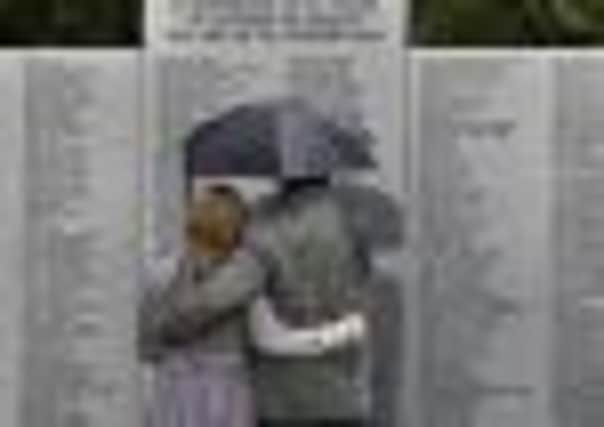Megrahi death: 23 years of legal twists and turns but questions remain


As the wreckage of Pan Am flight 103 cascaded through the night sky, another 11 victims were claimed in the Dumfriesshire town of Lockerbie.
Initially, the disaster was thought to be a tragic accident, but it soon became apparent the gravest criminal act in Scottish legal history had been committed. The question then became: by whom?
Advertisement
Hide AdAdvertisement
Hide AdThe investigation was a mammoth task. While much of the wreckage had landed in and around Lockerbie, lighter debris had been carried by a west wind as far as the North Sea.
The painstaking search continued month after month and covered an area of more than 810sq miles, much of it desolate moorland.
Eventually, the authorities believed the jigsaw had been completed. Semtex plastic explosive had been concealed in a Toshiba “Bombeat” radio-cassette player, which was in a bronze Samsonite hard-shell suitcase, along with a quantity of clothing.
The contention was that the suitcase, with an Air Malta luggage tag giving New York as its destination, had been loaded on to a plane at Luqa airport, Malta, and flown to Frankfurt in Germany, where it joined a Pan Am feeder flight to London.
At Heathrow, the case had been transferred to a baggage container and loaded on to Pan Am flight 103.
AT FIRST, Palestinian terrorists were suspected. A couple of months before the bombing, a cell of the Popular Front for the Liberation of Palestine – General Command had been broken in Germany and bomb-making equipment, Toshiba radios and a Pan-Am timetable were seized.
However, Libya was ultimately seen as the culprit, in revenge for a US bombing raid on Tripoli in 1986, when members of Colonel Muammar al-Gaddafi’s family were killed.
In 1991, Lord Fraser, QC, then Lord Advocate, obtained a warrant for the arrest of Libyans Abdelbaset Ali Mohmed al-Megrahi and Al-Amin Kalifa Fhimah. At the same time, an indictment was handed down by the US District Court of the District of Columbia.
Advertisement
Hide AdAdvertisement
Hide AdThe Crown was adamant that Megrahi had been a senior officer in the Libyan intelligence services (JSO) and Fhimah, his friend, had provided crucial assistance in getting the bomb-laden, unaccompanied suitcase on to the flight from Malta, where Fhimah had been Libyan Arab Airlines’ station manager.
Libya refused to give up its citizens for a trial in either Scotland or the US. Resolutions by the UN Security Council failed to resolve the impasse, and an anticipated breakthrough in 1994 failed to materialise.
It took more years of political wrangling before an agreement was reached. The trial would be held in the Netherlands, under Scots law, and the verdict would be delivered by three judges.
In April, 1999, Megrahi and Fhimah surrendered for trial at Kamp van Zeist, a former US airbase, near Utrecht.
The trial opened on 3 May, 2000, and the verdicts were delivered on 31 January, 2001.
The presiding judge, Lord Sutherland, announced he and Lords Coulsfield and MacLean had determined that Fhimah should be acquitted. However, they had been satisfied that various strands of circumstantial evidence had proved Megrahi’s guilt, and he was convicted of murdering the 270 victims.
Megrahi remained in the prison at Kamp van Zeist to await the hearing of an appeal. It took place before five judges in early 2002. Unanimously, they rejected the appeal.
MEGRAHI was flown to Scotland to serve a life sentence and told he would spend a minimum of 27 years in prison.
Advertisement
Hide AdAdvertisement
Hide AdSupporters continued to raise questions about Megrahi’s conviction, and his case was considered by the Scottish Criminal Cases Review Commission.
After a four-year investigation costing more than £1 million, the commission decided in 2007 that Megrahi should have a second appeal. Particular concerns were raised about the evidence of Maltese shopkeeper Tony Gauci, who had said Megrahi “resembled a lot” the person who bought the clothing packed with the bomb.
It was not until April this year that the first of Megrahi’s many grounds of appeal came to be heard. History will show that a ruling was never made.
Megrahi, stricken by prostate cancer, announced that he was abandoning the appeal. He was released from prison on compassionate grounds and allowed to fly home to Libya to have his final weeks with his family.
He remained a convicted man in the eyes of the law, but people around the world remained divided on his guilt.